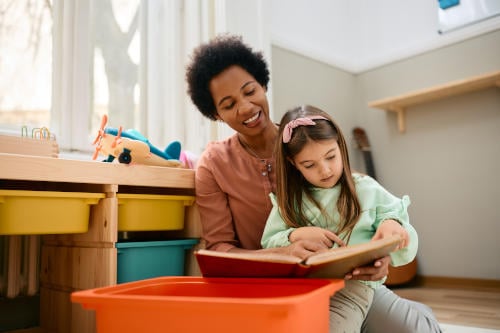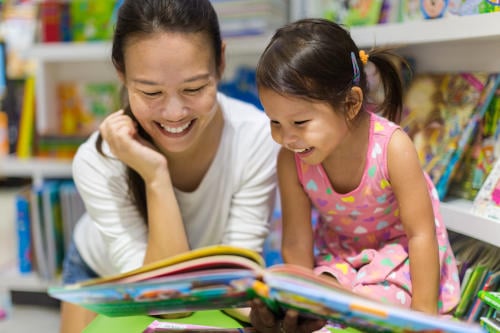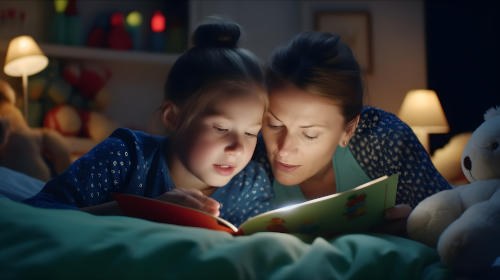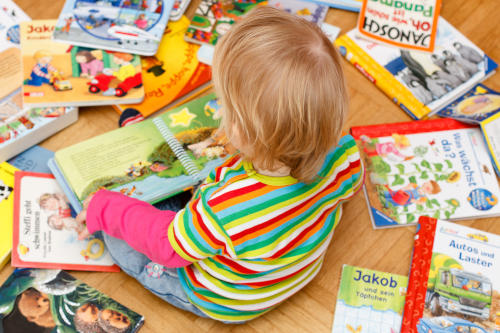Charlene Andruskevicius has twin sons, Oliver and Harry, who are now eighteen. Harry is autistic, visually and hearing impaired and has the cognitive ability of a much younger child. However, in the past eighteen months Charlene has taken to reading him bedtime stories and has been astonished at the positive impact it has had on his development and their relationship.
“I don’t know why I started doing it,” she ponders. “I wanted to get him to take a break from his iPad, I think, but he’s really taken to it, more than I expected. Now, every night, he says, ‘Mummy, reading!’ If he goes to bed a bit later at the weekend and I say there’s no time for a book, he loses his temper.”
All Children Benefit from Hearing a Story

Charlene, who lives in Stoke-on-Trent and is a qualified teacher, has always been passionate about the benefits of reading aloud to all children. “It’s massively important,” she says. “I love reading to kids, being expressive and silly and putting on voices for all the characters.
“There are lots of barriers to reading now. People seem to have a smaller attention span,” she continues. “It’s probably partly because of the internet and computers but also because we’re not used to waiting. We have easy access to everything we want – for example, there are about 500 TV channels to choose from. I think often, kids aren’t bored enough to pick up a book.”
Encouraging Kids to Look at a ‘Real’ Book

Because of this, Charlene only reads actual books with Harry (rather than Kindle versions) as she believes that the physical presence of a book, turning the page and looking at the illustrations, are important parts of the shared reading experience. At the moment, they are reading stories by children’s author Lisa Thompson – as Charlene likes the accessibility of the language she uses and the plot twists – but the plan is to experiment with other books and writers as time goes on.
“I ask Harry questions about the story afterwards. I’m not sure exactly how much he understands but he laughs and giggles at my expressiveness,” she adds. “Part of it is that he enjoys the experience of me being with him. It’s also helped him in other ways. He’s much more enthusiastic about going to the library with his college group now.”
Finding What Works for Different Children

Charlene also co-runs a community group, SEND Gin and Cheese, supporting other families of children with disabilities. She hesitates to recommend reading aloud to other parents as she recognises that what has been helpful for Harry might not ‘work’ for another young person. Even so, she admits that it might give people hope that there are always things you can try that might improve a child’s wellbeing.
“I used to read to both the boys when they were young,” she concludes. “Oliver loved it but Harry could never sit still and concentrate. It made me sad to think that I would never have that experience with him. It’s lovely that I’ve got the opportunity to read with him now, all these years later.”
Charity Recommendations

The Book Trust, a national charity that promotes reading and literacy for children, makes the following points on its website about reading aloud to kids of all abilities:
- Shared reading in the early years supports the development of a child’s attachment (how safe, secure and trusting they feel around their parent or carer). Attachment is essential to a child’s future happiness, social competence, and ability to form meaningful connections.
- Shared reading creates opportunities for joint attention and emotional closeness between a child and their parent or carer. The availability of the parent or carer during shared reading contributes to their sense of safety.
- Children with secure attachments are more likely to show enthusiasm and attention during shared reading, which motivates their parent/carer to read with them more frequently and reinforces their opportunity to feel safe, secure and protected.
- It is the emotional aspects of shared reading (cuddling, smiling, singing and laughing) that boosts a child’s brain activities needed to forge secure attachment, not the parent or carer’s reading skill.




